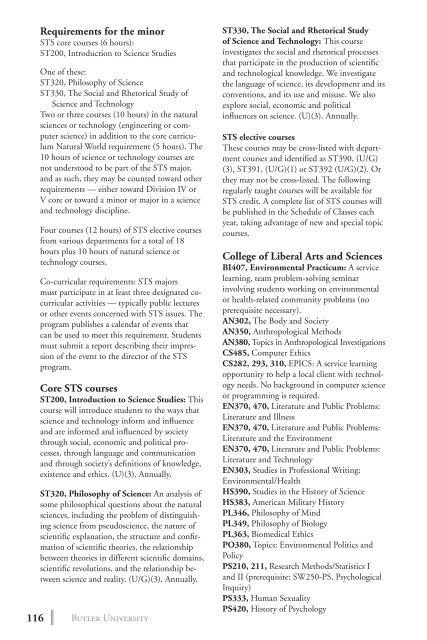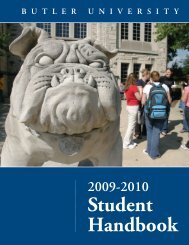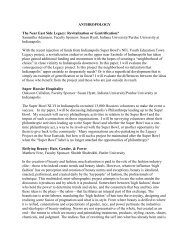2 0 1 3 bulletin - Butler University
2 0 1 3 bulletin - Butler University
2 0 1 3 bulletin - Butler University
You also want an ePaper? Increase the reach of your titles
YUMPU automatically turns print PDFs into web optimized ePapers that Google loves.
116<br />
Requirements for the minor<br />
STS core courses (6 hours):<br />
ST200, Introduction to Science Studies<br />
One of these:<br />
ST320, Philosophy of Science<br />
ST330, The Social and Rhetorical Study of<br />
Science and Technology<br />
Two or three courses (10 hours) in the natural<br />
sciences or technology (engineering or computer<br />
science) in addition to the core curriculum<br />
Natural World requirement (5 hours). The<br />
10 hours of science or technology courses are<br />
not understood to be part of the STS major,<br />
and as such, they may be counted toward other<br />
requirements — either toward Division IV or<br />
V core or toward a minor or major in a science<br />
and technology discipline.<br />
Four courses (12 hours) of STS elective courses<br />
from various departments for a total of 18<br />
hours plus 10 hours of natural science or<br />
technology courses.<br />
Co-curricular requirements: STS majors<br />
must participate in at least three designated cocurricular<br />
activities — typically public lectures<br />
or other events concerned with STS issues. The<br />
program publishes a calendar of events that<br />
can be used to meet this requirement. Students<br />
must submit a report describing their impression<br />
of the event to the director of the STS<br />
program.<br />
Core STS courses<br />
ST200, Introduction to Science Studies: This<br />
course will introduce students to the ways that<br />
science and technology inform and influence<br />
and are informed and influenced by society<br />
through social, economic and political processes,<br />
through language and communication<br />
and through society’s definitions of knowledge,<br />
existence and ethics. (U)(3). Annually.<br />
ST320, Philosophy of Science: An analysis of<br />
some philosophical questions about the natural<br />
sciences, including the problem of distinguishing<br />
science from pseudoscience, the nature of<br />
scientific explanation, the structure and confirmation<br />
of scientific theories, the relationship<br />
between theories in different scientific domains,<br />
scientific revolutions, and the relationship between<br />
science and reality. (U/G)(3). Annually.<br />
<strong>Butler</strong> <strong>University</strong><br />
ST330, The Social and Rhetorical Study<br />
of Science and Technology: This course<br />
investigates the social and rhetorical processes<br />
that participate in the production of scientific<br />
and technological knowledge. We investigate<br />
the language of science, its development and its<br />
conventions, and its use and misuse. We also<br />
explore social, economic and political<br />
influences on science. (U)(3). Annually.<br />
STS elective courses<br />
These courses may be cross-listed with department<br />
courses and identified as ST390, (U/G)<br />
(3), ST391, (U/G)(1) or ST392 (U/G)(2). Or<br />
they may not be cross-listed. The following<br />
regularly taught courses will be available for<br />
STS credit. A complete list of STS courses will<br />
be published in the Schedule of Classes each<br />
year, taking advantage of new and special topic<br />
courses.<br />
College of Liberal Arts and Sciences<br />
BI407, Environmental Practicum: A service<br />
learning, team problem-solving seminar<br />
involving students working on environmental<br />
or health-related community problems (no<br />
prerequisite necessary).<br />
AN302, The Body and Society<br />
AN350, Anthropological Methods<br />
AN380, Topics in Anthropological Investigations<br />
CS485, Computer Ethics<br />
CS282, 293, 310, EPICS: A service learning<br />
opportunity to help a local client with technology<br />
needs. No background in computer science<br />
or programming is required.<br />
EN370, 470, Literature and Public Problems:<br />
Literature and Illness<br />
EN370, 470, Literature and Public Problems:<br />
Literature and the Environment<br />
EN370, 470, Literature and Public Problems:<br />
Literature and Technology<br />
EN303, Studies in Professional Writing:<br />
Environmental/Health<br />
HS390, Studies in the History of Science<br />
HS383, American Military History<br />
PL346, Philosophy of Mind<br />
PL349, Philosophy of Biology<br />
PL363, Biomedical Ethics<br />
PO380, Topics: Environmental Politics and<br />
Policy<br />
PS210, 211, Research Methods/Statistics I<br />
and II (prerequisite: SW250-PS, Psychological<br />
Inquiry)<br />
PS333, Human Sexuality<br />
PS420, History of Psychology
















